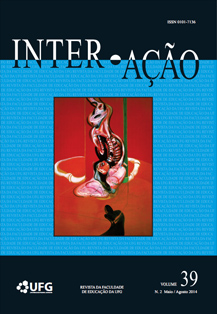A EDUCAÇÃO NA ÉPOCA DA CONECTIVIDADE EM REDE OU: QUE FIM LEVOU A AUTONOMIA?
DOI:
https://doi.org/10.5216/ia.v39i2.31711Keywords:
Autonomia, Sociedade em rede, Participação, Theodor Adorno, Educação críticaAbstract
Nesse texto se procura interpretar os rumos e as possibilidades da educação conforme as tendências presentes sob as condições do que Manuel Castells denomina sociedade em rede. A análise se baseia em contribuições de Rousseau a Marx – sobretudo referentes à apreensão da autonomia e da sociedade - que conduziram à teoria crítica da sociedade de Adorno e Marcuse. No capitalismo da sociedade em rede houve uma transferência da prática das redes financeiras para as redes sociais, sem atentar à diferença entre o tempo das finanças e o tempo das vidas humanas. Em relação a este quadro, procura-se apontar a atualidade da educação para a contradição e a resistência de Adorno como processo educacional crítico baseado na experiência da diferença e da contradição. Nela se contrapõem, de um lado, práticas combinadas com a educação existente na conexão em rede, com sua participação virtual, e, de outro, práticas alternativas em interações sociais objetivas e qualitativas.
Downloads
Downloads
Published
How to Cite
Issue
Section
License
Inter-Ação uses the Creative Commons Attribution 4.0 License for Open Access Journals (Open Archives Initiative - OAI) as the basis for the transfer of rights. Open access means making documents available on the Internet free of charge, so that users can read, download, copy, distribute, print, search, or link to the full text of documents, process them for indexing, use them as input data for software programs, or use them for any other lawful purpose, without financial, legal, or technical barriers.
Authors publishing in this journal agree to the following conditions:
1) Authors retain copyright and grant the journal the right of first publication, with the work simultaneously licensed under the Creative Commons Attribution License, which permits redistribution of the work with attribution and first publication in this journal.
2) Authors are permitted to enter into additional, separate agreements for non-exclusive distribution of the version of the work published in this journal (e.g., for publication in an institutional repository or as a book chapter), with attribution and first publication in this journal.
3) Authors are permitted and encouraged to publish and distribute their work online (e.g. in institutional repositories or on their home page) at any time before or during the editorial process, as this may generate productive changes as well as increase the impact and citation of the published work.















